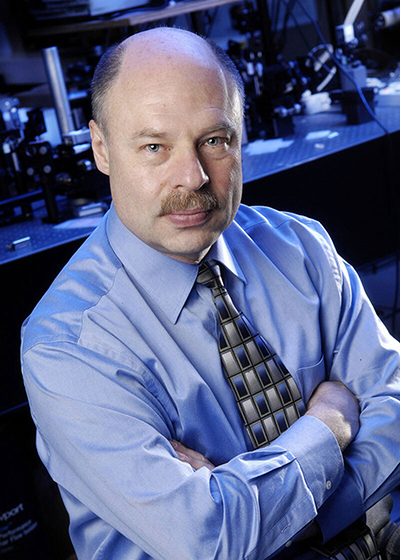Media contact: Brianna Hoge
 Sergey Mirov, Ph.D.
Sergey Mirov, Ph.D.
Photography: Steve Wood
The University of Alabama at Birmingham’s Sergey Mirov, Ph.D., a professor in the College of Arts and Sciences’ Department of Physics and lead researcher in developing and investigating tunable lasers, has been named general chair of the 2021 Advanced Solid State Lasers Conference.
It is the annual conference of the Optical Society of America Laser Congress — an esteemed global organization promoting the advancements of scientific research on lasers, optics and photonics — and will be held in Toronto, Canada, from Oct 3-7.
“This congress has a fascinating history,” Mirov said. “The Advanced Solid State Lasers Conference started in the mid-’80s, an era of critical breakthroughs in solid-state laser technology. At that time, several interesting solid-state lasers were developed. Continuous progress in laser technology enabled scientists and engineers to get deep insight and reach new scientific frontiers in physics, chemistry and material sciences and provided significant impact to multiple commercial, medical and defense-related applications.”
The ASSL Conference highlights new sources and discoveries in technologies, materials and applications of solid-state lasers. The meeting includes advances in optics, materials science, condensed matter physics and chemistry relevant to the development, characterization and applications of new materials and components for lasers and photonics.
As general chair, Mirov will be responsible for supervising the conference, recommending program chairs, plenary speakers and themes for the meeting, soliciting funds from granting agencies, and providing an overview of the current state of the topic area in the special issues of OSA journals.
The congress usually sets up an appropriate rotation between different continents — one year in North America, then Europe and Asia, to attract local scientists and students, Mirov says. However, due to the uncertainty of the spread of COVID-19, the congress will offer this year’s conference in a hybrid format: in-person and virtual, providing a flexible platform for leading scientists, engineers and students to share their results in all aspects of advanced solid-state lasers and applications.